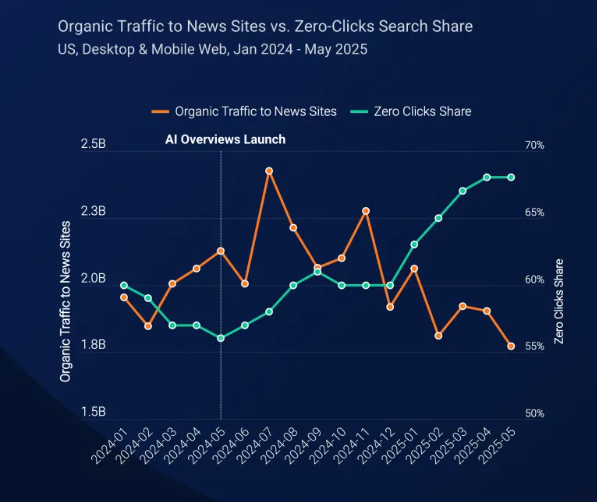Amid widespread concerns in the industry about AI search features impacting website traffic, Google spoke out on Wednesday to refute the allegations, claiming that the overall natural click volume sent by its search engine to websites remained "relatively stable" year-over-year, with an slight improvement in average click quality.
Liz Reid, vice president and head of Google Search, stated in a recent blog post: "This data contrasts with third-party reports that erroneously suggest a sharp decline in overall traffic, often based on flawed methodologies, isolated cases, or traffic changes that occurred before the launch of AI search features."
Although Google did not provide specific data to support its conclusion, even if the statement is true, it does not mean that AI has no impact on website traffic. Google itself acknowledges this, as Reid admitted, "User trends are shifting traffic to different websites, causing some sites to lose traffic while others gain it."

The word "some" carries significant meaning here, as Google has not disclosed specific data on how many websites have gained or lost traffic. While chatbots like ChatGPT have indeed seen increased visits, this does not mean online publishers have not been affected.
Google has been overhauling its search engine for years, allowing users to get more answers directly on search result pages. Now, through the "AI Overview" feature displayed at the top of search results, Google uses AI technology to achieve this. For certain queries, Google also allows users to interact with AI chatbots. However, Google denies these features significantly reshaped the search landscape, attributing the changes instead to users shifting their attention to other websites to start their queries.
Reid explained, "People are increasingly seeking and clicking on websites that contain forums, videos, podcasts, and posts where they can hear real voices and first-hand perspectives."
From these statements, it can be seen that Google.com may no longer be the preferred starting point for people going online. This trend had already been evident. In 2022, Google executives had previously said that social media platforms like TikTok and Instagram were eating into Google's core products, such as search and maps.

At the time, Prabhakar Raghavan, senior vice president for organizing knowledge and information at Google (now Chief Technology Officer), said, "In our research, about 40% of young people look for lunch locations without using Google Maps or search, but instead turn to TikTok or Instagram."
Google has long worried that Amazon.com has become the preferred choice for online shopping searches, while Reddit.com has become the go-to platform for researching topics of interest.
Over the years, Google has introduced various attractive features for consumers and retailers to draw more users to Google Shopping. These efforts included a universal shopping cart, local inventory checks, coupon finders, product image shopping from websites, and more. In 2020, Google even offered free shopping list services to merchants.
At the same time, as users complained about declining Google search quality, the search giant found that demand for Reddit was so high that it eventually added a "Reddit" filter, allowing users to narrow down results for relevant search queries. (This filter now simply appears as "Forums")
Therefore, Google's denial may indeed have some validity — it is not entirely AI that is killing search traffic. Search traffic has been declining for a while.
In this new blog post, Google also tried to change the standard for measuring clicks received by websites from Google. Now, Google no longer just counts the number of clicks, but hopes publishers consider the quality of clicks.
The company stated that the average click quality has improved, and the "high-quality clicks" sent to websites have "slightly increased" compared to a year ago. (Google explained that high-quality clicks are those where users do not quickly return — they stay and read the content.) However, Google did not reveal the exact growth rate. The company only pointed out that when people click into source websites through AI responses, they are more likely to read in-depth, making these clicks more valuable.
Additionally, Google portrays AI as an opportunity for online publishers to gain more exposure. Reid wrote, "Through AI Overview, people see more links on the page than before. More queries and more links mean websites have more opportunities to be discovered and clicked."
However, reports show that despite AI growing as a referral source, it has not yet compensated for the gap in click volume. A recent Similarweb study showed that the percentage of zero-click news sites due to online news searches increased from 56% (when Google launched AI Overview in May 2024) to 69% in May 2025.
It seems Google has also recognized this trend, recently launching a product for publishers to monetize reduced traffic in ways other than relying solely on ads, such as micropayments or newsletter subscriptions.
Now, Google's public relations campaign emphasizing "AI is not the end of search traffic" makes the situation appear even more serious. It's like Google wants publishers not to believe their own eyes — and charts and data — but instead take comfort in the fact that Google still sends "billions of clicks" to websites every day.










